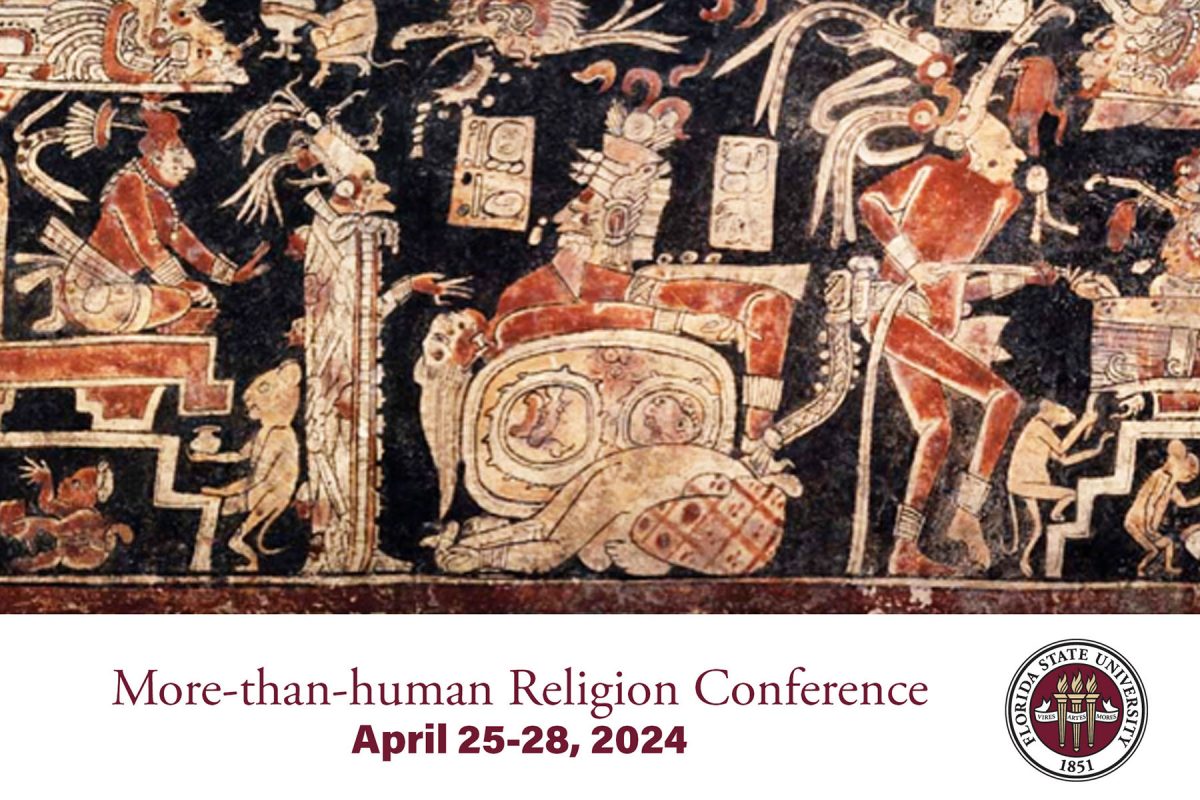
Florida State University is bringing together scholars from across humanities disciplines for a conference this week that will explore how Indigenous people have interacted with their environment in religious practice and what this means for us today.
The conference, “More-than-human Religion: Indigeneity, Objects, and Ecologies,” which features expert presentations, panel discussions, a public reception and book signing, is presented by FSU’s Department of Religion and FSU’s Native American and Indigenous Studies Center (NAIS), with the large conference program spanning April 25-28.
Participants will address emerging questions in the field regarding how to drive research beyond the strictly human aspects of religion, incorporate concepts like ecology and material culture and consider how to ethically engage with these subjects at talks held in multiple locations on the Tallahassee campus.
“I am delighted to be able to bring together an interdisciplinary group of scholars and community experts from around the world,” said co-organizer Sonia Hazard, an assistant professor of religion. “We are proud to be a small part of FSU’s commitment to building relationships and intellectual partnerships with the Indigenous nations and communities whose homelands are Tallahassee and the FSU campus.”
FSU’s Native American and Indigenous Studies Center was launched last year and unites research from academics across diverse disciplines within the university, including art, art history, music, modern languages and linguistics, religion, history, archaeology, geography and anthropology. Five affiliated faculty members from NAIS will present their research, and others from NAIS will be there.
“The ‘More-than-human Religion’ conference is exactly the type of project we want to support,” said Andrew Frank, director of the Native American and Indigenous Studies Center. “It’s multi-disciplinary, it places academics alongside Seminoles and Native American experts, and grapples with both local and global issues. Co-sponsoring this event is an amazing opportunity for us to learn from some of the world’s most influential voices and for us to share the fantastic work being done by our faculty, students and alumni.”
“We are proud to be a small part of FSU’s commitment to building relationships and intellectual partnerships with the Indigenous nations and communities whose homelands are Tallahassee and the FSU campus.”
– Sonia Hazard, conference co-organizer and assistant professor of religion
Presentations will emphasize the reciprocal relationship between humans and nature as found in many Indigenous religious traditions. From South Asian beliefs in rivers as goddesses, to the important role of plants in Mesoamerican religious ritual, to the symbiotic relationships of pollinating insects with human agriculture, Indigenous traditions often explore how humans and the material world have the power and ability to impact the other.
Organizing questions will center around how to understand non-human influences on the world and how religious studies can affect social, political and environmental spheres of society. To reach these diverse methodologies, the conference invites participation from groups outside religion, such as art history, anthropology, geography and history. Nearly three dozen scholars are slated to present or participate, coming from FSU, across the U.S., and as far away as Belgium and the Netherlands.
Programming will include keynote lectures, plenary panels and panels featuring faculty and graduate students. The keynote address will be given by Amitav Ghosh, an internationally acclaimed writer who blurs the line between anthropology, environmental studies, cultural criticism and Indigenous studies in his work.
“I’m so excited for this conference,” said Martin Kavka, religion department chair. “So much of humanities research at the turn of the millennium was about disenchanting and demystifying the world. But the speakers being brought to campus by Elizabeth Cecil and Sonia Hazard, co-organizers and professors, are showing us how people have and do enchant their worlds and improve them as a result.”
Among the conference highlights is a museum panel featuring curators and professionals from the Seminole Tribe’s Ah-Tah-Thi-Ki Museum. Located on the Big Cypress Reservation in Hendry County, Florida, the museum provides a learning opportunity about the Seminole people’s history and culture in the Southeast and Florida. Representatives from the Ah-Tah-Thi-Ki will be sharing their expertise about museum practices and heritage preservation for the more than 200,000 works of art and historic objects they manage.
“I hope that participants come away with new ideas and tools for rethinking the ‘more-than-human’ dimensions of their research programs and professional lives,” Hazard said.
The conference is free and open to the public. For registration, the schedule of presentations, a full list of abstracts and more, visit morethanhuman.create.fsu.edu.
To learn more about the FSU Department of Religion, visit religion.fsu.edu. For more about the FSU Native American and Indigenous Studies Center, visit nais.fsu.edu.



